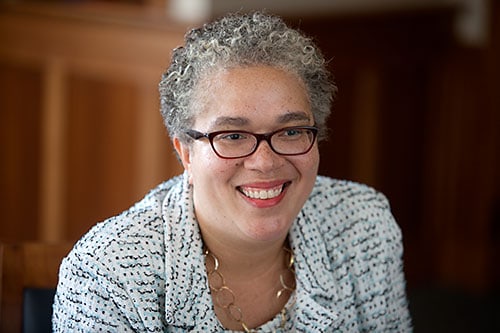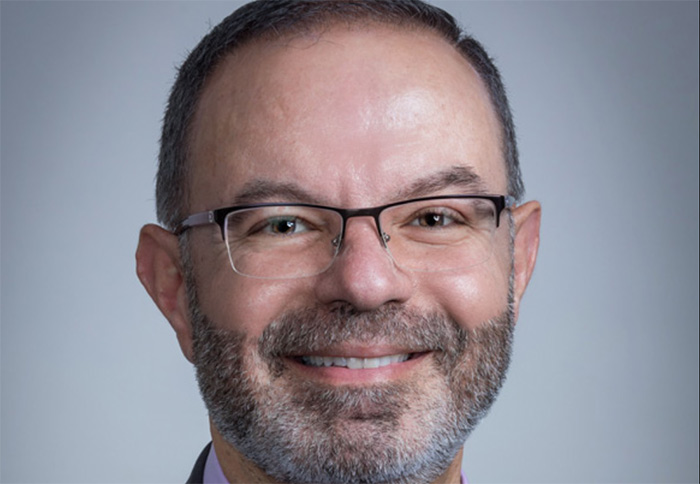New Pomona College president brings unique perspective

As a scholar and professor of English literature, published author, researcher in neuroscience and an academic dean, the multidisciplinary approach employed by G. Gabrielle Starr throughout her career has not been one of happenstance.
“It is practiced curiosity,” she said. “There must be an effort to integrate different kinds of knowledge very intentionally.”
Ms. Starr, who began her tenure as the 10th president of Pomona College this summer, grew up in Tallahassee, Florida. She began undergraduate studies at Emory University at 15, earning bachelor’s and master’s degrees in women’s studies. She continued her studies at Harvard University, earning a PhD in English literature in 1999.
A postdoctoral fellowship followed at the California Institute of Technology—funded in part by a Mellon Foundation Fellowship—and led to a research project in cognitive neuroscience.
Her research at CalTech crossed academic disciplines in neuroscience and psychology. Through MRIs, Ms. Starr explored how people responded to paintings, music and other forms of art often called “aesthetic experience.”
Her second book, Feeling Beauty: The Neuroscience of Aesthetic Experience, was an exploration of new tools for analyzing the way people respond to works of art or other aesthetic objects, she explained. Ms. Starr proposes that the aesthetic experience should not be limited to only conventional objects of beauty, like flowers or a poem.
“Lots of things on the outside aren’t visually appealing,” she said. “The neuroscience of aesthetics shows us that even something like a crucifixion, which shows the body in horrifying ways, can be powerfully significant to us.”
Ms. Starr emphasizes that people—particularly those in academia—need to look at, and tackle, challenges or conflicts from many different angles.
“We need to ask ourselves, ‘What if a scientist looked at this? How would a historian look at the problem?’ This was one of the things that drew me to Pomona College—the understanding that there are different views to different problems,” she said.
Her research at CalTech wrapped up in 2000, so Ms. Starr headed east to New York University after accepting a faculty position in the college’s English department. Her career at NYU would last 15 years, during which time she served as chair of the English department, director of undergraduate studies and, lastly, as dean of the College of Arts and Science before joining Pomona College this July.
Ms. Starr’s appointment last year as Pomona’s president is one of many firsts—she is the first African American and the first woman to hold the position.
“It’s surprising we’re still at a place of firsts in the American experience,” she said. “It is both humbling and mildly irritating.”
Her job as college president, she says, is to represent faculty, staff and the student body and to find ways to promote interaction between the groups. As a woman and an underrepresented minority in academia, she feels confident she can provide a new perspective to the Pomona College community.
“They can see the path ahead,” she said. “The mentorship is not restricted. There is an openness from which everybody can benefit.”
She is settling nicely into Claremont life with her husband, two children and, most recently, her mother. They have found Claremont very friendly, she says, and enjoy early-morning walks to the Sunday farmer’s market and visits to the local libraries. Ms. Starr values both the “college town vibe and the intentionality with which Claremont commits to providing services,” but there are a few West Coast traditions that contrast her East Coast life.
“California is a pastry culture, but New York is a bagel culture,” she quipped. “And the poke bowls? That’s definitely a California thing.”
Culinary differences aside, she looks forward to her tenure and has set out to provide opportunities for exchange between the Pomona community and the student body, who are the last generation of millennials—a group she believes have gotten a “bad rap.” She describes them as generous and empathetic.
“I will say one thing about this generation, they are quick to argue for people not in the room or for people who don’t have the privilege of being in the room,” she said.
One feature of the millennial platform and, one could say, on the farthest ends of the national political landscape, is the perception that in academic life there is a coordinated effort at indoctrination, which sometimes results in rejection of anything “organized.” And in the ferocity of today’s political climate, finding common ground between academics and society-at-large can sometimes seem futile.
“It is true that there is a correlation between increasing levels of education and discussion of how multi-cultures are valued, or that expanding opportunity is better than restricting and that access is a priority. These should not be issues of the left or right,” she said. “But language about ‘cultures’ and ‘access’ tend to be polarizing.”
To foster the level of dialogue millennials crave, Ms. Starr has initiated “Open Hour,” a program used during her days at NYU, where college deans go beyond just offering office hours but have regularly scheduled times they sit in a room and allow students to stop in to talk. Most millennials, she proposes, were raised “talking in a manner that is limited by characters” through social media.
Her goal is to not just get people talking but to get faculty and administrators to, literally and figuratively, “be where students are.”
“This generation will have seven or eight career changes in their lifetime. We need to prepare students to talk with people who are very different from themselves.”
She hopes her reach will go beyond Pomona College, an institution she says will certainly continue on its trajectory as one of the nation’s leading liberal arts colleges.
“The Colleges together are already a force for good in the Inland Empire,” she said. “My goal is to stay connected with the cities of Claremont and Pomona, because this is our home.”
Ms. Starr will be inaugurated on Saturday, October 14 at two public events: From 9 a.m. to noon, the public is invited to a symposium. The inauguration ceremony will take place at 3 p.m. at Bridges Auditorium, 450 N. College Way, on the eastern edge of Marston Quad on the Pomona College campus. The ceremony is open to the public but ticketing is required. Visit pomona.edu/inauguration/schedule-events to obtain tickets or for more information on the day’s events.
—Kathryn Dunn
editor@claremont-courier.com









0 Comments